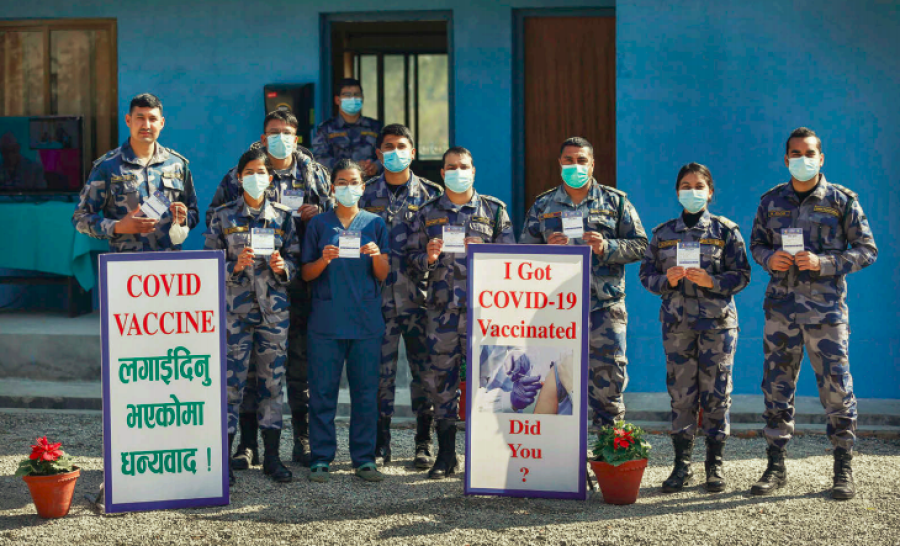Health
It may take years to inoculate everyone against Covid-19, experts say
Officials at the Health Ministry say only preparations to start a mass vaccination campaign may require three months.
Arjun Poudel
Only around 18.6 percent of the people the government targeted to vaccinate under the first phase of the Covid-19 inoculation drive have received their shot until the fifth day of the campaign, which officials aimed to complete within 10 days.
As authorities scramble to step up the pace of vaccinations, of the 430,000 frontline health workers and essential workers who were supposed to get inoculated in the first phase, only 88,007 have done so so far, officials said. Experts say that the numbers indicate that it may take years for all eligible people to get the vaccine.
“It is easier said than done,” Dr Baburam Marasini, former director at the Epidemiology and Disease Control Division, told the Post. “Ongoing drive shows our capacity. It may take years to administer vaccines to all eligible people using the existing system.”
While inaugurating the first phase drive on Wednesday, Prime Minister KP Sharma Oli had said that the government will immunise all eligible citizens within three months.
However, on Saturday, he said the government plans to do that within a year.
The Ministry of Health and Population, which had earlier decided to set up immunisation booths only at district hospitals, has now decided to extend the programme to primary healthcare centers, but that hasn’t improved the pace of the drive.
Officials hoped that health workers serving in rural municipalities and female community health volunteers, who have not been able to reach the district headquarters for immunization due to various reasons, including transportation problems, can reach primary health care centers.
But even after all health workers are immunised, it would be difficult to immunise the wider population of over 21 million people over 14 years of age within three months. Authorities would have to inoculate at least 480,000 people a day to achieve the target. Children under 14 years old can’t be immunised, as vaccines have not been tested on them.
Officials at the Health Ministry said that only preparations to start a mass vaccination campaign could take three months.
“First of all it is impossible to secure the required doses as almost all countries are vying to secure vaccines for their own population,” an official at the ministry told the Post asking not to be named. “Secondly, our system of immunization is not sufficient enough to administer a new vaccine to the entire population at once,” the official added.
“I don’t think we can easily secure the required doses, as even the European countries have placed restrictions on exports due to short supplies.”
Officials at the Health Ministry said that they have been told that attempts are being made to procure an additional four million doses within a month. But there is no clarity yet as to how the government plans to procure around 45 million—given the 10-15 percent possible wastage—doses of vaccines required to vaccinate all eligible citizens.
“We have been told by senior officials that vaccines will come in surprising ways but we do not know more,” Dr Samir Kumar Adhikari, joint spokesperson for the Health Ministry, told the Post.
If Nepal receives six million doses through the World Health Organisation’s COVAX programme, which will be enough to inculcate 20 percent of the population, the government still needs 40 million more doses of the vaccine.
Nepal rolled out its Covid-19 vaccination drive on Wednesday, a little over a year after the country confirmed its first coronavirus case on January 24, 2020.
The inoculation drive was launched after India supplied one million doses of Covid-19 vaccine, developed by the University of Oxford and pharmaceutical giant AstraZeneca and locally manufactured by the Serum Institute of India, the world’s largest vaccine manufacturing company.
The India-manufactured vaccine, named Covishield, is Nepali authorities’ preferred choice, as the country’s existing storage facility supports the vaccine to maintain its cold chain. The Covidshield vaccine needs to be stored in temperatures between 2 to 8 degrees Celsius.
Meanwhile, public health experts warned that prioritising the new drive at the cost of the regular health programmes will jeopardise campaigns against other diseases. “Under the pretext of fighting the pandemic, most of the regular health programmes have been affected,” said Marasini, former director at the Epidemiology and Disease Control Division. “If we compromised other regular programmes for the immunisation drive, more people could die of other health problems.”
Due to the ongoing pandemic, most of the programme—maternal health, child health, nutrition, mental health, tuberculosis, immunisation and others have been affected.
Experts suggest the government set up a dedicated mechanism if it wants to launch a mass vaccination drive at once.
“New dedicated mechanisms for vaccination should be created and additional human resources should be hired to achieve the target,” Dr Bikash Lamichhane, former director at the Child Health Division, told the Post.
“If we employ the existing mechanism, we will not only risk affecting other regular programmes, but it will also be difficult to achieve the targets.”




 13.12°C Kathmandu
13.12°C Kathmandu















